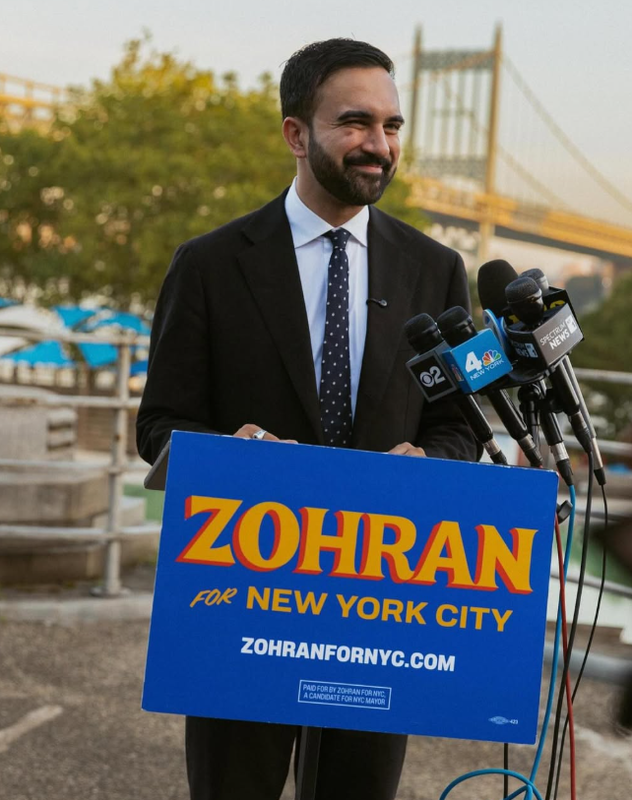“Will New York Become the Next Rust Belt?” — Wall Street Panics as Radical Progressive Mayoral Candidate Surges in New York
Input
Modified
Polls at Just 1% Early This Year — From Unknown to Frontrunner Free Childcare and Rent Freeze Spark Grassroots Surge Some Companies Now Considering Leaving New York

Wall Street, the undisputed center of global finance, has been thrown into a state of panic by a political earthquake few saw coming. The shock reverberated far beyond the city’s financial district as Zohran Mamdani, a young and fiercely progressive member of the New York State Assembly, stunned the political establishment by clinching first place in the Democratic primary for the New York City mayoral race. His meteoric rise has not only defied every conventional political prediction but also sparked widespread fears that the city, long regarded as a symbol of capitalist dynamism, could veer toward economic decline reminiscent of America’s Rust Belt.
The anxiety gripping Wall Street is rooted in the sheer audacity of Mamdani’s platform. His bold agenda champions sweeping rent controls, massive tax hikes on the wealthy, and a range of free public services designed to reshape the city’s socioeconomic landscape radically. For the financial elite, the prospect of a self-proclaimed socialist steering the world’s financial capital is more than just unsettling; it is existentially threatening. With the general election looming in November, major financial players are scrambling to assess the damage a Mamdani victory could inflict on their interests and the broader economic stability of the city.
The Stunning Rise of Zohran Mamdani
When Mamdani declared his candidacy in October, his prospects seemed slim at best. Few believed that a relative political unknown could pose any serious challenge to Andrew Cuomo, a three-term governor of New York and a towering figure within Democratic Party circles. Mamdani, lacking the pedigree of previous mayors like Rudy Giuliani, a former federal prosecutor, or Michael Bloomberg, a billionaire media mogul, was dismissed by many as a fringe candidate whose ambitions far exceeded his political capital.
Yet Mamdani’s rise was anything but accidental. His deep-rooted commitment to progressive politics traces back to his college years, when he founded a student group advocating for Palestinian rights. His activism took a dramatic turn during the 2023 war between Israel and Hamas, when he staged a five-day hunger strike in a show of solidarity with Palestine. That moment crystallized his broader worldview, a relentless fight against perceived injustice, whether at home or abroad, and an unapologetic alignment with causes often shunned by mainstream politicians.
Mamdani’s campaign was a reflection of this ethos. It was fueled by an uncompromising slate of promises that resonated powerfully with disillusioned voters, particularly the younger generation. His vision of a New York where bus fares are completely free, rent hikes are frozen indefinitely, and the ultra-wealthy are taxed to fund expansive social programs struck a chord with voters weary of inequality and entrenched political power. His platform captured the attention and enthusiastic endorsement of icons of the American progressive movement, including Senator Bernie Sanders and Representative Alexandria Ocasio-Cortez, both of whom lent their voices and political machinery to amplify Mamdani’s message.
A crucial element of Mamdani’s success lay in his mastery of digital campaigning. Unlike his opponents, whose campaigns leaned heavily on traditional media and elite donor networks, Mamdani embraced social media as his battleground. His TikTok and Instagram feeds were filled with relatable, charming videos of him exploring local eateries and interacting with ordinary New Yorkers, creating an image of a candidate who was both approachable and authentically grounded in the community. His appearances on popular podcasts further cemented his status as a fresh, dynamic figure unafraid to challenge the status quo. The result was a groundswell of organic support that translated into a formidable campaign army of more than 27,000 volunteers, alongside an impressive USD 8 million in grassroots fundraising, a remarkable achievement for a candidate whose name was virtually unknown in political circles just months earlier.
Cuomo’s campaign, sensing the rising threat, pivoted aggressively to attack. His team sought to portray Mamdani as an inexperienced radical, seizing on his pro-Palestinian activism to brand him as anti-Israel in an attempt to alienate moderate voters and key donor bases. Mamdani, however, proved deft at navigating the political minefield, issuing a swift rebuttal that there was no place for anti-Israel sentiment in his movement, effectively neutralizing the charge before it could gain traction. The campaign escalated further when, during a televised debate, Cuomo sought to undermine Mamdani’s credibility by claiming he lacked the executive experience necessary to manage a complex metropolis like New York or to stand firm against figures like Donald Trump. Mamdani’s response was a rhetorical dagger, coolly reminding Cuomo and the audience that, unlike the former governor, he had never resigned in disgrace, a brutal reference to Cuomo’s fall from power in 2021 amid multiple sexual harassment allegations.
Despite Cuomo’s formidable backing from Wall Street billionaires like Bill Ackman, Dan Loeb, and Michael Bloomberg, and even an 11th-hour appeal from former President Bill Clinton, the political machine built to stop Mamdani ultimately collapsed. What made the upset even more dramatic was the overwhelming consensus among pollsters that Cuomo was a lock for victory, with forecasts just weeks before the primary placing his chances at well over 90 percent. Yet, against all odds, the 34-year-old Mamdani flipped the script, transforming what had begun as a long-shot campaign into one of the most consequential political upheavals in recent New York history.

Wall Street Scrambles as Fears of a Fiscal Meltdown Grow
As the reality of Mamdani’s ascent sinks in, panic has begun to take hold among New York’s financial elites. The prospect of an administration committed to policies that would freeze rents, raise the minimum wage to USD 30 an hour, and eliminate bus fares, all while extracting higher taxes from corporations, has triggered alarm not just on Wall Street but across the broader business community. These proposals, while wildly popular among the progressive base, are being viewed by investors and financial executives as nothing short of economically catastrophic.
Even media outlets traditionally sympathetic to progressive causes have not minced words. The New York Times, in a sharply critical editorial, warned that while Mamdani may be captivating to elite progressives, the actual implementation of his policies could spell disaster for the city’s economic health. Their critique echoed growing concerns that the financial strain from such expansive welfare programs would hollow out the city’s tax base and drive away both investment and jobs.
Indeed, these fears are no longer theoretical. Increasing chatter among major financial firms suggests that some are actively preparing contingency plans to relocate their headquarters out of New York altogether. States like Florida and Texas, long favored for their business-friendly tax regimes, have emerged as the most attractive alternatives. Reports from The Wall Street Journal confirm that a significant number of top executives are considering moving their firms, citing the dual threat of looming tax hikes under a Mamdani administration and what they perceive as an uncomfortable shift toward anti-Israel sentiment in the city’s political discourse.
A Warning Sign for Blue States Nationwide
The tremors rattling Wall Street are not confined to New York City. They are the latest chapter in a larger, long-brewing saga of demographic and economic shifts reshaping the American political landscape. For years, a quiet but steady exodus has been underway as individuals and businesses flee Democrat-controlled states in search of more favorable economic climates. What was once dismissed as anecdotal has now become an undeniable trend, supported by decades of data from the Internal Revenue Service.
Between 1990 and 2021, over 13 million people left blue states like California, Illinois, New Jersey, Massachusetts, and New York. During that same period, Republican-led states such as Florida, Texas, Arizona, North Carolina, Tennessee, Nevada, and South Carolina welcomed nearly an identical number of incoming residents. This migration is not merely about preference for warmer weather or lower property costs, it is an economic referendum on governance models. The driving forces behind this exodus are a tangled web of mounting public pension liabilities, inefficient and bloated housing subsidies, declining public education systems, and chronic underperformance in crime control.
As homelessness surges and tax burdens swell, many residents have come to the conclusion that progressive governance, for all its intentions, is failing to deliver a sustainable quality of life. The wave of departures is compounded by rising frustration over limitations on school choice and a perception that state governments are increasingly hostile to businesses and high-income earners.
The stark warning from economists and policy analysts is that without a dramatic policy reversal, blue states risk locking themselves into a death spiral of declining populations, eroding economic vitality, growing welfare dependency, and deepening poverty. Recommendations to stem this tide are nothing short of revolutionary for traditionally progressive regions. They include measures long associated with conservative orthodoxy, deep tax cuts, aggressive crime reduction, regulatory rollbacks, pension system reforms, school choice expansions, and the scrapping of rent control laws.
The story unfolding in New York is not just a local political drama; it is a national issue. It is a cautionary tale for every city and state grappling with the tension between progressive ideals and fiscal realities. Whether Mamdani’s rise represents a brave new future or the beginning of New York’s economic unraveling is a question that now hangs heavily over the city, and indeed, the entire nation.





















